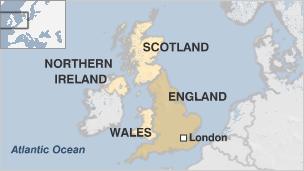England profile - Overview
- Published

England is the largest constituent part of the United Kingdom, and accounts for 83 per cent of its population and most of its economic activity.
Issues affecting the United Kingdom as a whole therefore also apply to England in particular, especially in the case of identity politics. England's continuing contribution to world civilisation is significant, ranging from language to sport, music and law.
The various kingdoms set up by Germanic settlers in the 5th-6th centuries were finally united into the Kingdom of England between 927 and 954. The Norman Conquest of 1066 brought in a new ruling class from northern France and heavily influenced the language, culture and European orientation of the country.
Oxford University is England's oldest university
England gradually annexed Wales and established hegemony over Ireland and Scotland. This Kingdom of England had a distinct identity until it was subsumed into the United Kingdom of Great Britain in 1707.
The establishment of devolved parliaments in Northern Ireland, Scotland and Wales after 1997 gave those constituent parts of the United Kingdom their own political identity, leaving England the only part directly run by the British government.
This has raised the profile of the "West Lothian question", namely that Scottish MPs can vote on specifically English matters in the Westminster parliament while English MPs have no say over Scottish affairs.
Between 1998 and 2010, England had its own quasi-governmental organisations and Regional Assemblies, which were, however, not directly elected. In June 2010, the new Conservative-Liberal Democrat coalition government announced that it was abolishing regional strategies and returning planning powers to local government.
Curry houses in London: Immigration has added to England's ethnic and cultural diversity
Only the London Assembly, which was formed in 2000, is directly elected. The Assembly holds the Mayor of London - the most powerful directly-elected politician in the United Kingdom - to account by monitoring his spending and other activities.
The former Labour government's proposals for other elected assemblies were dealt a blow by the rejection of such a body in the North-East of England in a 2004 referendum.
Plans for referendums in other regions were subsequently abandoned, although referendums on directly-elected mayors have been conducted in major cities along the lines of the London mayorship.
A campaign for an English parliament grew out of a belief in certain quarters that the Devolution acts of 1998 had put England at a serious political and constitutional disadvantage. Cornwall, an English county with a separate Celtic identity, has also seen a campaign for its own devolved regional assembly.
Identity
According to the most recent census data, about 95% of the population of Scotland and Wales identify as White British, rising to 99% in Northern Ireland. The comparable figure for England is just under 85%. Therefore most of the British debate about ethnic diversity, immigration and national identity in fact applies to England.
This sensitive political question is further complicated by two factors.
First, British and English institutions and national identifiers such as flag, language, anthem and popular culture largely overlap. As a result, markers of specific English identity, such as the flag of St George, tend to be unofficial, while similar signs of Scottish and Welsh nationhood are sanctioned by the separate institutions of those countries.
Second, Scottish and Welsh nationalist movements have long been part of the political mainstream, and are seen as champions of legitimate historical national identities. English nationalism, on the other hand, has often been portrayed as a reaction to non-white immigration and seen as largely the province of the far right. But there is a constitutional nationalist movement that focuses on the English parliament issue.
This makes public discussion of English identity politics difficult, as politicians on the left and right have discovered, as accusations of racism and appeasement of minorities are exchanged.
Originating in England, cricket has spread around the world
The one area where English identity is able to develop without political controversy is the realm of culture, and sporting teams are often the most comfortable focus for national loyalty.
Culture
England has made a number of major contributions to civilisation, perhaps the most significant being its language. Through a combination of British colonial expansion and trade, plus the world-power status of the United States since 1945, English has approached de facto international second language status.
Outside the large areas of the world where it is already an official if not first language, English predominates in international diplomacy and has become the main language in science, communications, business and the entertainment industry.
It is estimated that more than a billion people can speak English at a basic level. Among other cultural achievements, England's sporting life is followed worldwide, in particular its football Premier League and cricket team.
English law has influenced the legal system of many countries around the world
In terms of popular music, England's international impact has rivalled that of the United States from the Beatles and the Rolling Stones to the club scene of the 1990s and beyond.
Law
English law underpins a variety of legal systems worldwide. A common-law system distinct from that practised in the rest of Europe, it spread with the expansion of the British Empire and applies in many countries previously ruled by Britain.
Under common law, judges apply legal precedent in court on the basis of previous court rulings. This is distinct from civil law, the predominant legal system in the world, which requires judges to apply prior abstract rules to cases under consideration.
As the United Kingdom is a member of the European Union, European civil law is also applicable in England and Wales in matters pertaining to interpretation of European Union law.
When Britain leaves the EU in 2019, as expected, the status of European civil law will have to be reviewed.
England's countryside, in particular its landed estates, is popular with tourists